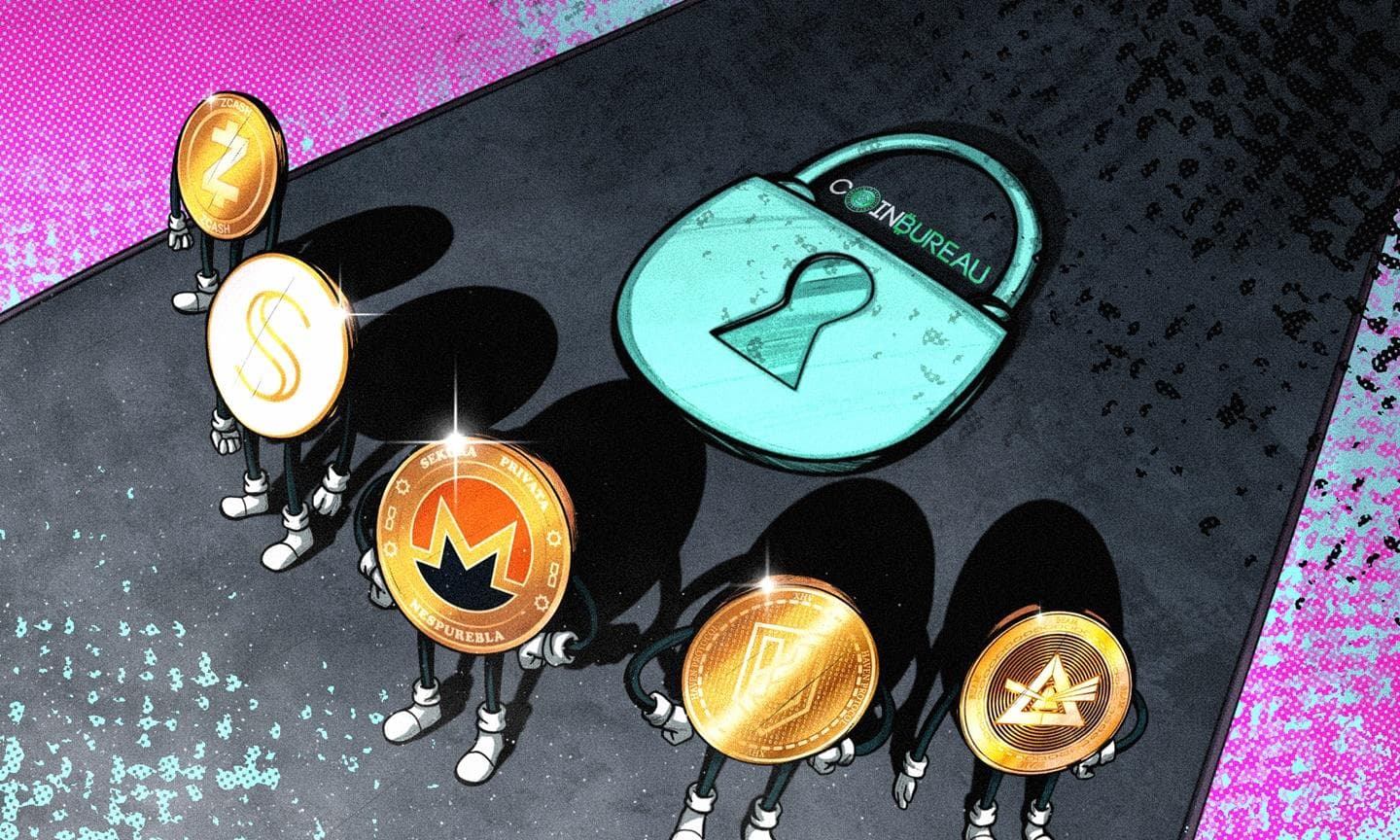In today's digital-first world, the concept of identity goes beyond physical borders and traditional identification methods. Digital identity networks have emerged to offer a secure and efficient solution for verifying and managing identities online.
These networks leverage advanced technologies such as blockchain, biometrics and cryptography to create a secure and reliable digital identity for users. Their main goal? To provide a seamless experience where individuals can prove who they are without the need for physical documents or repetitive verification processes. These networks operate by creating a digital representation of an individual's identity, which can be used across various platforms and services. They ensure that personal data is securely stored and shared only with authorized entities, reducing the risk of identity theft and fraud.
As more aspects of our daily lives move online, from banking and shopping to education and healthcare, the need for reliable digital identities has become critical.
Enter Worldcoin
A notable project in digital identity is Worldcoin, founded by Sam Altman, CEO of OpenAI, the creator of ChatGPT. Worldcoin aims to create a global, inclusive identity system by distributing cryptocurrency and using biometric technology, specifically iris scanning, to establish unique digital identities for everyone.
The impact of Worldcoin could be profound. By offering a universally accessible digital identity, it has the potential to significantly reduce the barriers to financial inclusion and provide a secure way for individuals to interact with the digital economy. However, the project has faced several roadblocks and is banned in a number of countries.
In this article, we delve into the realm of digital identity networks, exploring why digital identity networks are crucial in today's digital landscape, and examining both technical and regulatory challenges they face. Additionally, we'll look beyond projects like Worldcoin to explore alternative solutions and highlight the top digital identity networks shaping the future.
What is a Digital Identity Network?
Before diving into the world of digital identity networks, let's establish a clear understanding of what a digital identity is.
In essence, it's your virtual representation across the internet. It encompasses all the information that defines you online, including login credentials, social media profiles, and even browsing data collected by websites. This digital identity plays a crucial role in the online world, acting as the key that unlocks access to various services and platforms.
Now, enter the concept of a digital identity network. Imagine a secure online marketplace where various data sources and verification tools come together. These networks function by collecting and analyzing information from different sources to create a more comprehensive picture of an individual's digital identity. This collaborative approach allows businesses and organizations to make informed decisions regarding trust and risk management.
Here's how it works: Traditional identity management systems often rely solely on usernames and passwords for verification. This creates vulnerabilities, as stolen credentials or weak passwords can easily compromise security. Digital identity networks address this limitation by incorporating additional verification methods. This can involve anything from phone number confirmations to biometric data (fingerprint or facial recognition) verification, depending on the level of security required.
In cryptocurrency, digital identity networks take on a specific role that intertwines with the core principles of blockchain technology.
Why are Digital Identity Networks Important?
Decentralization and security are central to the crypto ethos. However, ensuring trust and preventing fraud requires some form of user verification. This is where digital identity networks become crucial players in the crypto ecosystem.
Traditional identity management systems often struggle to keep pace with the evolving threat landscape, leading to vulnerabilities and breaches. Digital identity networks offer a solution to these challenges by providing robust security measures and sophisticated authentication mechanisms. Traditional identity management systems typically rely on outdated methods such as usernames and passwords, which are prone to exploitation by cybercriminals. Moreover, these systems often lack interoperability, making it challenging to integrate with modern digital platforms and services. Additionally, they may pose privacy concerns, as they often require individuals to disclose sensitive personal information unnecessarily.
Digital identity networks built on blockchain technology offer a compelling solution:
- Decentralization: These networks operate on a decentralized infrastructure, eliminating the vulnerabilities of centralized databases. Users hold greater control over their data, reducing the risk of breaches and unauthorized access.
Self-Sovereign Identity (SSI): The concept of SSI empowers users to manage their own digital identities within a crypto wallet. This wallet stores verifiable claims about their identity, such as proof of residency or educational qualifications. Users then choose which claims to share with different platforms, fostering greater control over their data footprint.
Blockchain Integration: The secure and tamper-proof nature of blockchain technology provides a reliable platform for storing and managing identity data. Cryptographically secured credentials stored on the blockchain are highly resistant to fraud and manipulation, fostering trust within the crypto ecosystem.
Beyond Worldcoin: Exploring the Landscape
Worldcoin launched in 2023 to promote the adoption of Proof of Personhood and decentralized finance, both crucial in the AI era. Users receive a unique identifier by completing a verification process that confirms they're a real person. Over 10 million people across 160 countries have created a World ID and a compatible wallet, collectively conducting 75 million transactions. As of April 17, 2024, 5,398,636 people have also verified their World ID using an Orb.
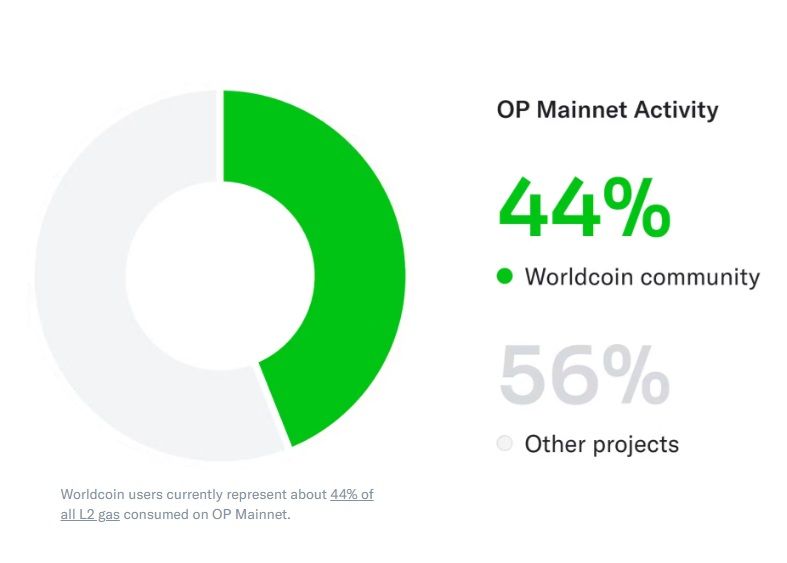 Worldcoin Statistics. Image via Worldcoin
Worldcoin Statistics. Image via WorldcoinHowever, Worldcoin isn't the only game in town. While Worldcoin presents a novel approach, there are several reasons why alternative digital identity networks exist, each addressing different needs and challenges:
- Differing Philosophies: Not all digital identity solutions prioritize privacy to the same extent. Some may offer a trade-off between privacy and convenience. This flexibility can be beneficial in scenarios where certain personal information needs to be disclosed to access particular services or benefits. For instance, a network designed for healthcare might require verified medical history attributes, which are crucial for providing appropriate care but might be unnecessary for financial transactions.
- Focus on Specific Use Cases: Different digital identity networks may cater to particular industries or applications. For example, a network focused on verifying identities for online gaming platforms would have different requirements and verification processes compared to one designed for financial transactions.
- Technical Variations: The underlying technology powering these networks can vary significantly. Some networks might leverage different blockchain protocols, cryptographic techniques or other technological frameworks to achieve their goals. For instance, some might use permissioned blockchains for enhanced privacy and control, while others might use public blockchains for greater transparency and decentralization.
So, why should we explore different options?
- Catering to Different Needs: A variety of solutions allows users and businesses to choose the network that best aligns with their specific needs for privacy, security, and functionality. For example, individuals who prioritize anonymity might prefer a network with strong privacy measures, while businesses requiring detailed user information for compliance purposes might opt for networks offering comprehensive verification processes.
- Fostering Innovation: Competition between different networks drives innovation and continuous improvement within the overall digital identity space. As networks strive to offer better features and services, users benefit from enhanced security, usability, and efficiency. This competitive environment encourages the development of new technologies and methodologies.
- Finding the Right Fit: No single solution might be the perfect fit for all situations. Different scenarios require different levels of security, privacy, and user experience. By exploring alternative solutions, users and businesses can adopt a more tailored approach to identity management, selecting the network that best meets their specific requirements.
Top Digital Identity Networks
Imagine a future where you have a single, secure, and self-sovereign digital identity that you can use to seamlessly interact across various online platforms. This identity would empower you with control over your personal data, while providing businesses and governments with a more reliable and secure way to verify users.
Digital identity networks, like the ones we've highlighted below, hold the potential to create a more secure, efficient, and user-centric online experience for everyone.
Galxe
The Galxe Identity Protocol introduces a system that empowers users to control their private data and identity, revolutionizing credential issuance and verification in the Web3 environment. Credentials, essential proofs of eligibility like keys, certificates, deeds and licenses, are integral to both on-chain activities (such as contributions to liquidity pools, voting history, and campaign participation) and traditional Web2 data (such as online behaviour tracked by companies like Google and Meta).
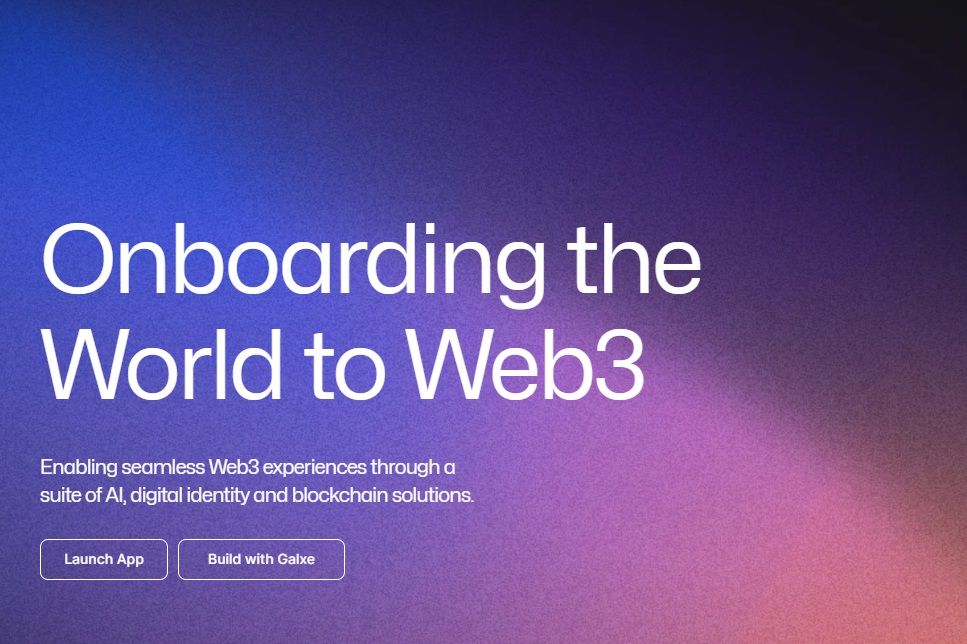 Galxe Empowers Users to Control Their Private Data and Identity. Image via Galxe
Galxe Empowers Users to Control Their Private Data and Identity. Image via GalxeUnlike traditional systems where users don't own their data or control its usage, the Galxe Identity Protocol offers a permissionless, self-sovereign identity infrastructure powered by Zero-Knowledge Proofs. This technology ensures that users can securely and privately manage and share verifiable credentials. The protocol also presents numerous opportunities for developers to create Sybil prevention algorithms, reputation systems, credit systems, personal data markets, and decentralized review systems.
The protocol allows users to control their information and benefit from it. For instance, users won't need to disclose extensive personal details for verification purposes, reflecting a near-future scenario where individuals fully own and manage their digital identities.
Technically, the Galxe Identity Protocol consists of smart contracts deployed on-chain and SDK tools for developers to issue or authenticate credentials off-chain. It includes four key roles: Credential Holder, Issuer, Verifier, and Credential Type Designer. The protocol enables holders to selectively disclose information, issuers to manage revocable credentials on-chain, and verifiers to use programmable trust schemas for various applications. Additionally, the protocol supports the minting of soul-bound tokens (SBTs) based on typed credentials and facilitates no-code compositional verification, enhancing overall verification efficiency.
Civic
Civic Pass is a multi-chain, wallet-agnostic identity and access management solution. It enables you to manage access based on your verifications or inputs from Civic's Identity Verification Services. An active Civic Pass confirms a user's wallet meets your DApp's requirements, allowing you to block non-compliant users before transactions proceed. Civic Pass supports document coverage for nearly 200 countries.
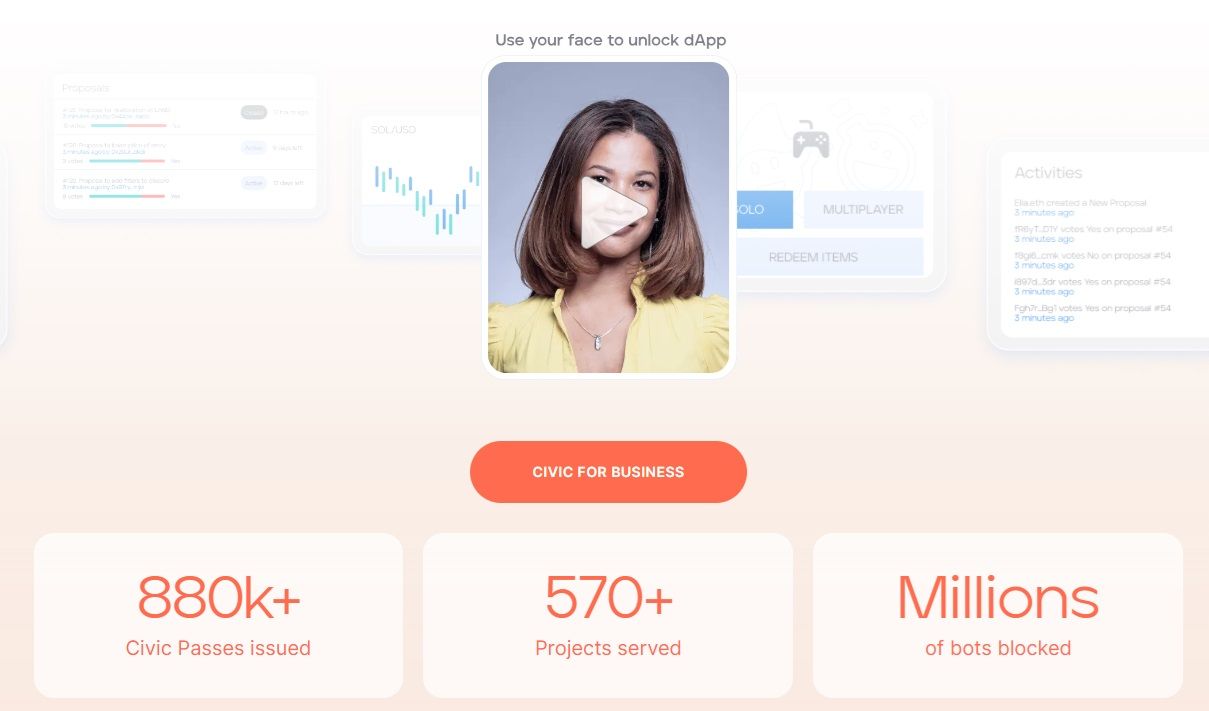 Civic Pass is a Multi-Chain, Wallet-Agnostic Identity and Access Management Solution. Image via Civic
Civic Pass is a Multi-Chain, Wallet-Agnostic Identity and Access Management Solution. Image via CivicUse cases for Civic Pass's on-chain identity and access management services include smart contracts, DApps, and Web2 companies entering blockchain.
Sybil & AI Resistance
Civic Pass can be used for access control, gaming, NFTs and online communities. This requires a live video selfie from the user, which will be matched to their corresponding wallet. It ensures:
- Uniqueness: Verifying a unique human behind every wallet
- 1-person-1-wallet: Reducing the presence of bad actors
Compliance
Civic Pass ensures compliance for CeFi, DeFi, Real World Assets (RWAs) and gambling platforms. Users must meet specific access or KYC requirements before being allowed into your DApp or service. It checks for:
- Document verification and data extraction
- Live facial comparison to identity documents
- Email ownership verification
- IP check for excluded or OFAC-sanctioned countries
- Sanctions check
Civic Pass is available on:
Lukso
LUKSO is a Layer 1 EVM-based blockchain compatible with all Ethereum tools. It targets creative economies, allowing brands, creatives, and developers to manage wealth and influence distribution through universal profiles, digital identities, certificates and tokenized communities.
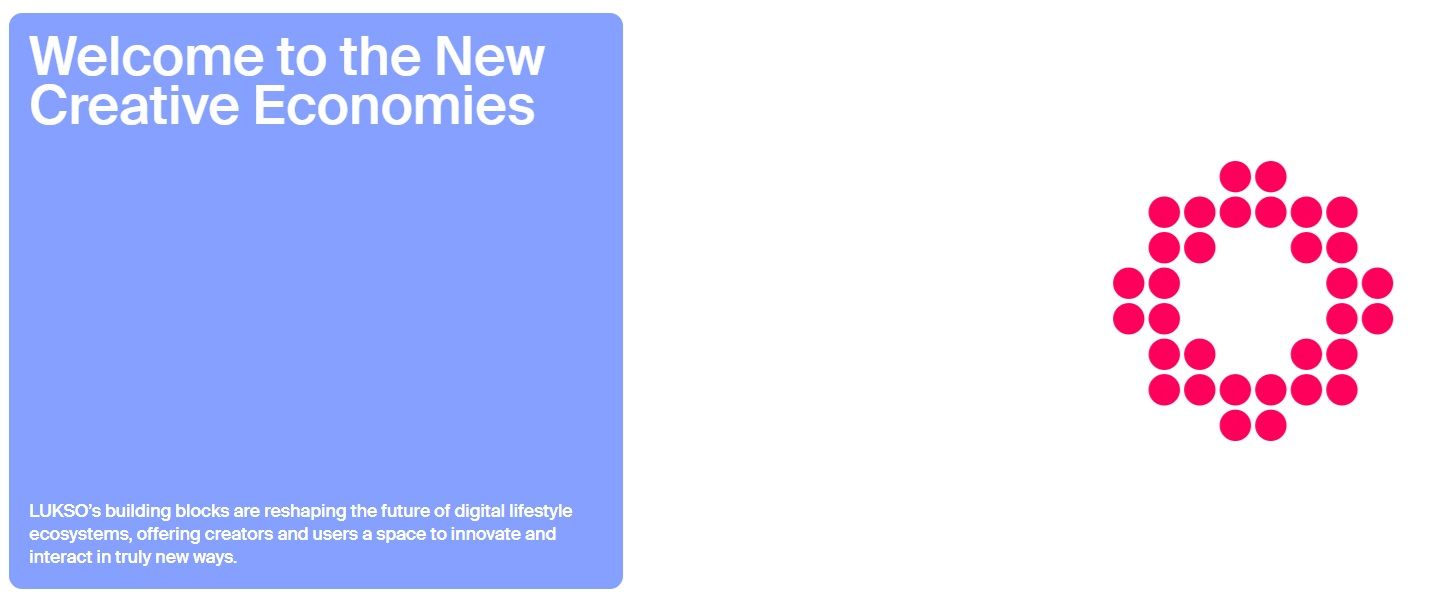 LUKSO is a Layer 1 EVM-Based Blockchain. Image via Lukso
LUKSO is a Layer 1 EVM-Based Blockchain. Image via LuksoLUKSO Standard Proposals are fundamental for building flexible, interactive blockchain applications that enhance user experience. Its main features are:
- Upgradeable Security: Universal Profiles can be managed by EOAs or custom contracts like multisigs, with social recovery options.
- On-chain Profile: Users can create detailed on-chain profiles.
- On-chain Notifications: Notifications for token transfers and asset visualization within profiles, with allow/block lists for asset transfers.
- Updatable and Flexible Metadata: Dynamic NFTs with updateable properties.
- Extendable Accounts: Seamless account extension without redeployment.
- Gasless Experience: Transaction Relay Services cover gas fees, eliminating the need for native tokens to start interactions.
Metadium
Metadium is designed to provide individuals with control over their digital identities, integrating real-world and virtual identities into a cohesive whole. It aims to revolutionize identity management, enabling users to manage, protect and utilize their identities as they see fit.
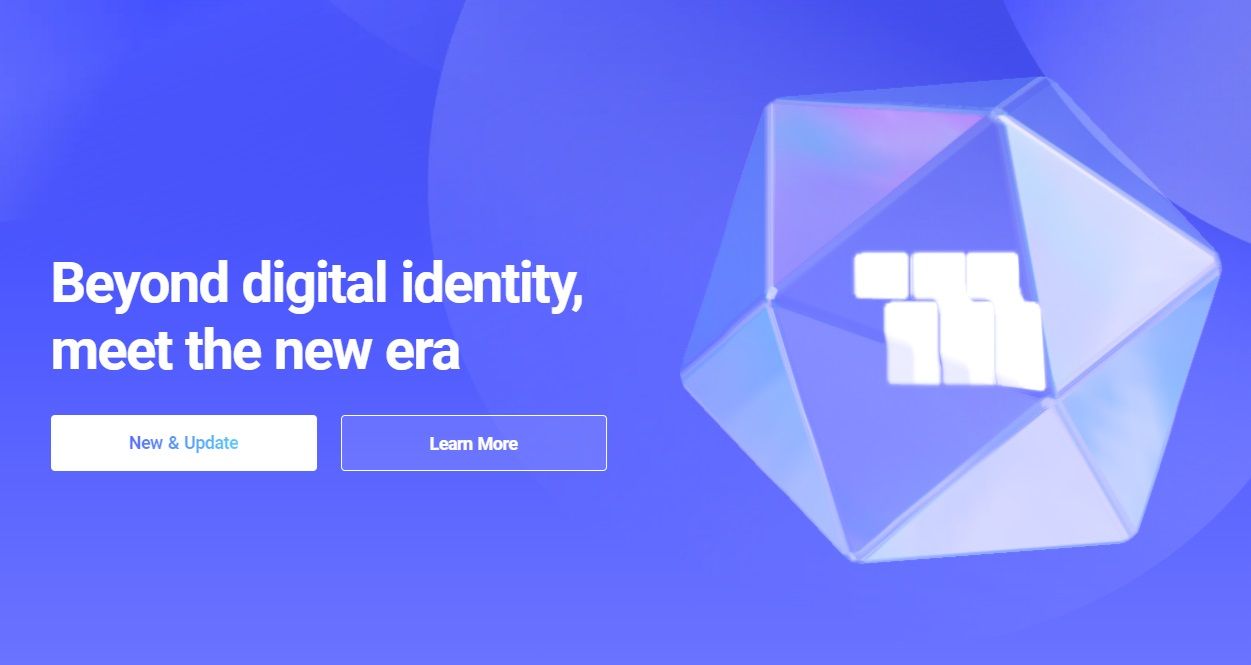 Metadium is Designed to Provide Individuals With Control Over Their Digital Identities. Image via Metadium
Metadium is Designed to Provide Individuals With Control Over Their Digital Identities. Image via MetadiumMetadium was created to address the fragmentation of identities across online and offline worlds. The platform allows individuals to control, protect, and use their identity seamlessly. By leveraging blockchain technology, Metadium ensures minimal disclosure of personal information, sharing data only with user consent. Its infrastructure supports identity creation through optional verification, enabling the use of Metadium IDs across various platforms and services. The protocol also supports off-chain and cross-blockchain identities through oracles, aiming to enhance digital identity awareness and maintain data integrity.
Looking ahead, Metadium is set to tackle the challenge of interoperability between different blockchain platforms, a significant issue for decentralized identifiers (DIDs). Current DID platforms are often confined to specific blockchains, making cross-platform verification difficult due to differing data formats and verification processes.
Metadium aims to create an integrated identity system by connecting with various heterogeneous blockchains. This Metadium Identity Layer will enhance security, expedite identity verification and simplify digital identity management.
Cheqd
Cheqd is a privacy-preserving network looking to revamp trusted data economies. It empowers users and organizations with full control over their data through self-sovereign identity (SSI) and blockchain technologies. With its public, permissionless network, cheqd offers payment rails for decentralized identities, verifiable credentials and trusted data markets.
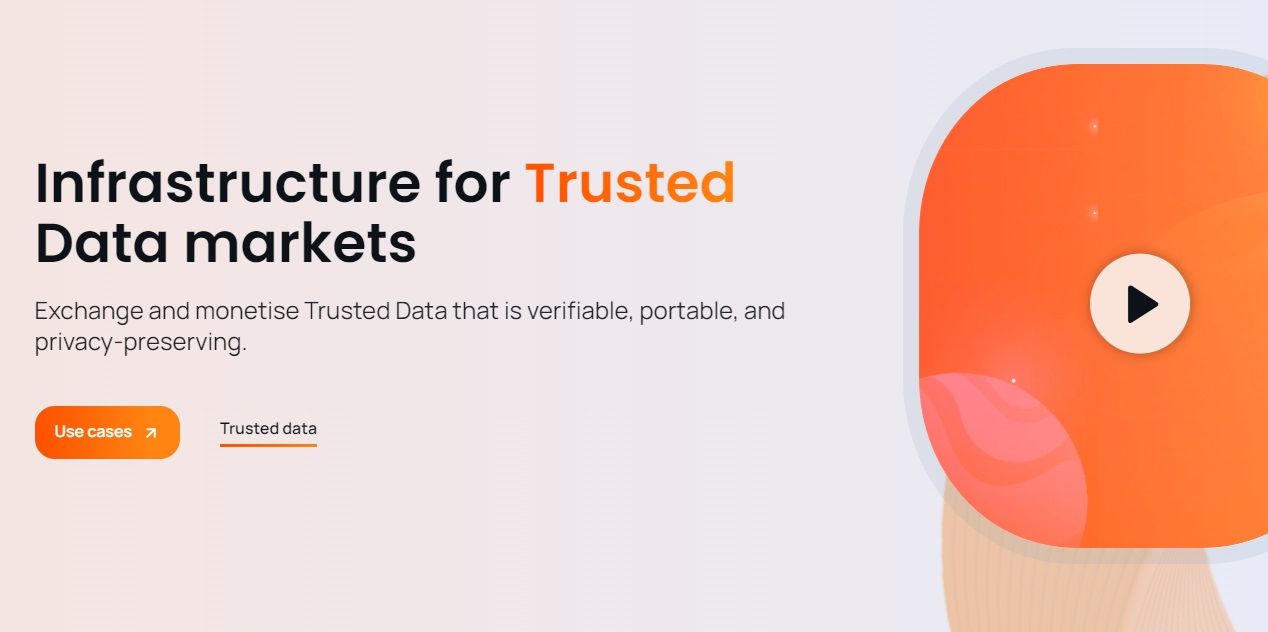 Cheqd is a Privacy-Preserving Network Looking to Revamp Trusted Data Economies. Image via Cheqd
Cheqd is a Privacy-Preserving Network Looking to Revamp Trusted Data Economies. Image via Cheqd
Here are a few of its key features:
- Ownership and Control: Cheqd places the user at the center, providing full ownership, portability, and control over data and identities.
- Privacy-Preserving: The platform prioritizes privacy and ensures that data can be transacted securely within its payment network.
- Customizable Solutions: Cheqd offers highly customizable solutions, from off-the-shelf credentials to bespoke private network offerings, catering to diverse business needs.
- Open-Source Blockchain Network: As an open-source blockchain network, Cheqd facilitates easy, inclusive, and secure exchange and payment for trusted data.
- Verifiable Credentials (Creds): Creds are portable, reusable, private, and secure credentials used to build reputation and prove the authenticity of individuals. They offer a private and revocable way to establish identity across platforms and ecosystems.
Cheqd introduces payments for digital credentials, creating new revenue models for organizations and individuals. Its Credentials-as-a-Service subscription allows easy issuance of credentials and creation of decentralized identifiers through a ready-made software-as-a-service package. It provides APIs for lightweight integration into organizations.
SelfKey
SelfKey is a blockchain-based digital identity management platform that enables individuals and businesses to securely own, control, and manage their identity data. It provides a range of features and tools to facilitate identity verification, document authentication and identity wallet management.
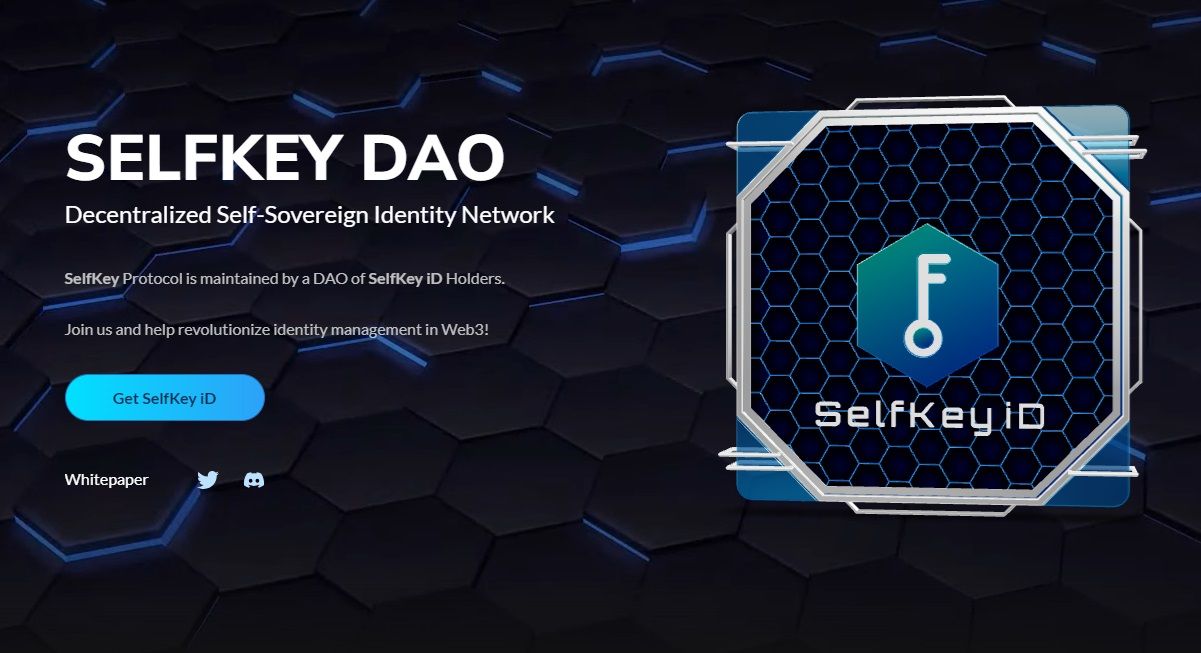 SelfKey is a Blockchain-Based Digital Identity Management Platform. Image via SelfKey
SelfKey is a Blockchain-Based Digital Identity Management Platform. Image via SelfKeyThe main features of SelfKey are:
- Identity Wallet: SelfKey offers a secure digital wallet where users can store and manage their identity documents and credentials. This wallet ensures the privacy and security of sensitive information, allowing users to control access to their data.
- Identity Verification: Through SelfKey's identity verification feature, users can verify their identity quickly and securely using trusted third-party verification providers. This streamlines the onboarding process for businesses and enhances security for individuals.
- Document Authentication: SelfKey enables users to authenticate and verify documents digitally, eliminating the need for manual verification processes. This feature ensures the integrity and authenticity of documents, reducing the risk of fraud and forgery.
- Decentralized Identity: SelfKey leverages blockchain technology to provide decentralized identity solutions, allowing users to maintain control over their identity data without relying on centralized authorities. This enhances privacy, security, and transparency in identity management.
- Marketplace: SelfKey features a marketplace where users can access a variety of identity-related services, such as passport renewal, company incorporation, and bank account opening. This marketplace streamlines the process of accessing essential services while ensuring security and compliance.
Kilt Protocol
KILT is a protocol for self-sovereign data and interoperability, built on the permissionless KILT blockchain. At its core, KILT offers a digital identity protocol that enables the generation and management of decentralized identifiers (DIDs) and the issuance and presentation of digital verifiable credentials (VCs). Unlike centralized alternatives, KILT emphasizes self-sovereign data and revocable credentials anchored to its blockchain.
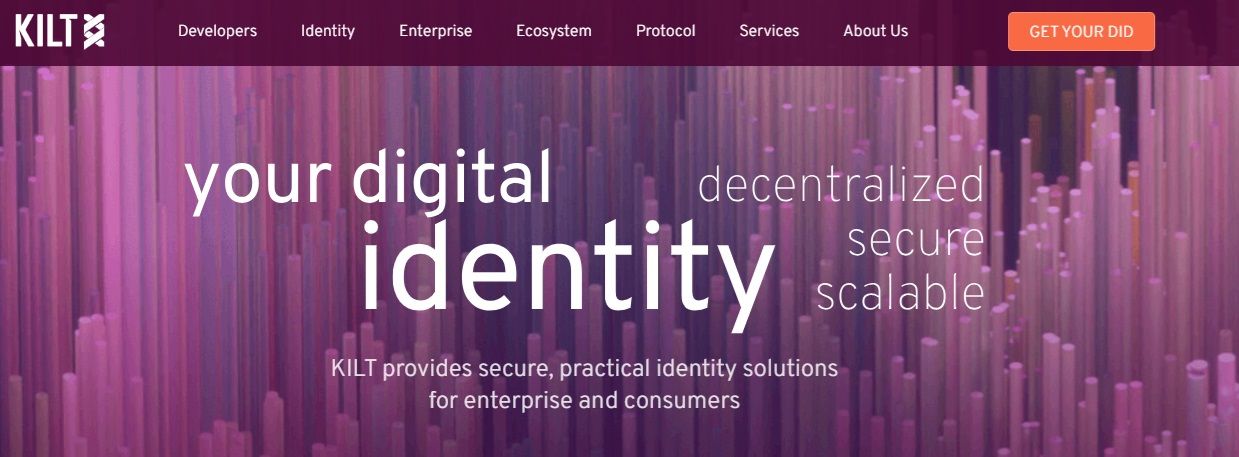 KILT is a Protocol For Self-Sovereign Data and Interoperability. Image via KILT
KILT is a Protocol For Self-Sovereign Data and Interoperability. Image via KILTKey offerings of KILT include:
- Universal Identity Protocol: KILT provides a universal identity protocol for individuals, organizations, objects, and intelligent agents to obtain credentials for various attributes issued by trusted Attesters.
- Self-Sovereign Mechanism: Users have control over their data, choosing when and where to make their credentials public and determining the level of information they wish to share.
- Trust Market: KILT facilitates a Trust Market for Attesters, allowing widely trusted entities to be compensated for their valuable attestation work.
The protocol addresses the drawbacks of centralized identity systems by empowering individuals to manage their own data and build digital identities based on credentials issued by trusted entities. KILT aims to shift control back to users, offering privacy-preserving and user-controlled mechanisms for presenting and verifying credentials.
Challenges of Digital Identity Networks
Digital identity networks offer a promising solution, but they are not without their challenges.
These networks face hurdles on both the technical and legal fronts, impacting user adoption and widespread implementation. Let's delve into the key challenges that digital identity networks need to overcome to reach their full potential.
Technical Challenges
- Interoperability Issues: Different digital identity networks often operate in silos due to a lack of standardized protocols and data formats. Imagine needing separate login credentials for every website you visit, even if they require similar identity verification. This fragmented user experience hinders the broader adoption of digital identity networks.
- Technology Adoption: Widespread adoption requires overcoming user hesitancy and business concerns. Users might be wary of trusting a new technology with their personal data, while businesses may face upfront costs and complexities associated with integrating new systems.
- Integration with Legacy Systems: Existing identity management systems within organizations often rely on outdated technologies. Integrating these legacy systems with new digital identity networks can be a complex and expensive undertaking. The technical infrastructure might not be compatible, and data migration can be a significant hurdle.
Regulatory and Legal Challenges
Data privacy regulations like GDPR (General Data Protection Regulation) and CCPA (California Consumer Privacy Act) have varying requirements for how personal data is collected, stored, and shared. This creates a challenge for digital identity networks that aim to operate globally, as they need to comply with a patchwork of regulations.
Worldcoin, the largest digital identity network, has faced significant regulatory challenges. Its use of iris scans for user verification raised concerns about data privacy and user consent. Additionally, the network's global ambitions has clashed with local regulations in countries like Spain and Kenya.
The legal status of digital identities is still evolving, particularly in areas like liability, ownership and dispute resolution. Unclear legal frameworks can erode user trust and confidence in the system. In addition, the ownership and control of intellectual property associated with digital identities, such as underlying technologies and data models, need to be clearly defined. Unclear ownership rights can stifle innovation and collaboration within the ecosystem.
Future of Digital Identity Networks
Digital identity networks hold immense promise for revolutionizing how we interact online and manage our digital identities. As these networks mature and overcome current challenges, their impact will be felt across various industries:
Potential Impact on Industries
- Financial Services: Streamlined KYC (Know Your Customer) processes, improved fraud prevention, and secure access to financial products can be facilitated by digital identity networks. Imagine a world where opening a new bank account is as simple as presenting your verified digital identity!
- Healthcare: Secure and controlled sharing of medical records between patients and healthcare providers can be enabled. This can improve patient care coordination and empower individuals to manage their health information effectively.
- Government Services: Digital identity networks can streamline citizen interactions with government agencies. Imagine applying for a passport or renewing a driver's license without cumbersome paperwork, all through a secure digital identity platform.
- E-commerce: Enhanced security and reduced fraud risks can lead to a more seamless and trustworthy online shopping experience. Digital identity networks can allow for faster and more secure checkout processes, boosting customer confidence.
Emerging Trends and Advancements
- Integration with the Metaverse and Web3: As the metaverse and Web3 technologies evolve, digital identity networks will play a crucial role in user authentication and ownership of digital assets. Think of a virtual world where your verified digital identity grants you access to exclusive experiences and allows you to seamlessly own and manage virtual assets.
- Biometric Authentication: Biometric authentication methods like fingerprint scans or facial recognition can offer a more convenient and secure way to verify identities within digital identity networks. However, concerns around privacy and security need to be addressed before widespread adoption.
- Regulatory Frameworks for Digital Identities: An official government-sanctioned framework will be crucial for establishing trust and ensuring the responsible use of the technology.
Top Digital Identity Networks: Closing Thoughts
Digital identity networks hold immense potential to transform how we interact online and manage our identities. They offer a secure and user-centric approach to identity verification, aiming to empower individuals with control over their personal data while providing businesses and governments with a more reliable and efficient way to verify users.
However, significant challenges remain. Technical hurdles like interoperability issues and integration with legacy systems need to be addressed. Regulatory and legal frameworks for data privacy, intellectual property rights, and the legal status of digital identities require careful consideration and collaboration between governments and industry leaders.
Despite these challenges, the potential benefits are undeniable. These networks have the potential to revolutionize various industries, from streamlining financial services and healthcare to enhancing security in e-commerce and the burgeoning metaverse.
The future of digital identity networks is bright, but success hinges on overcoming existing challenges and fostering a collaborative environment that prioritizes user privacy, security, and innovation.




